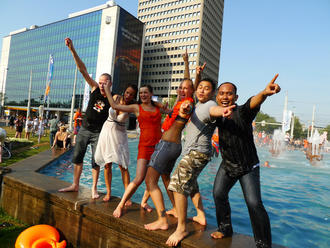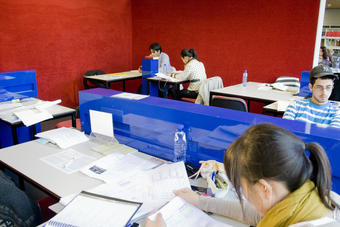Holland stands out for its great
inventiveness, its problem-solving attitude and its openness to the
world. Studying in Holland offers you the space to be a pioneer, be
creative and get connected.
The more than 2,100 English-taught
study programmes and courses cover a broad range of fields. All
programmes and courses lead to a bachelors, masters or PhD degree, a
diploma or certificate.
Why Study in Netherlands?
Quality of higher education
Higher education in Holland has a worldwide reputation for its high quality. This quality is guaranteed through a national system of regulation and quality assurance. Dutch law (the Higher Education and Research Act) states that degree programmes offered by higher education institutions must be evaluated against a specific set of criteria, assessing the content and the level of the course. Bachelor’s and master’s programmes that meet the criteria are accredited (i.e. officially recognized).
In 2014, there were eleven Dutch universities in the top 200 of the Times Higher Education World University Ranking, making the Netherlands the fourth best represented country on the prestigious list.
Pioneering
Holland
has proven to be a true pioneer for discovering inventive solutions to
everyday problems. The way the Dutch created a large part of the country
by reclaiming land from the sea shows their pragmatic approach to
living below sea level.
We can also see this approach when it comes to education. For a small country like Holland, an international orientation - extending into education and training - is a must to be a successful competitor in our increasingly internationalized world. Holland was also the first non-English speaking country to offer courses taught in English.
Creative
The important role of the Dutch in the international design industry is a reflection of their creative drive. The creative sector in Holland is world famous for its innovative ideas and ground-breaking Dutch Design. It is perhaps because of the Dutch way of teaching that creativity has acclaimed such an important role in Dutch society. Students are challenged to solve problems with an out-of-the-box approach and work together in case studies to gather and share knowledge.
Connected
Being
a small country, Holland is open to the world and to surrounding
countries. Cooperating with other countries is key to being successful
for the Dutch. The strong connection between Dutch higher education
institutions and the business world creates possibilities for practical
assignments and internships to prepare students for a career in an
international environment.
The Dutch education system is interactive, student-centred and focused on teamwork, which makes it easy to meet other international students. The teaching method at Dutch higher education institutions is founded on respect for each individuals opinions and convictions. This respect is a national virtue that characterizes Holland's diverse and plural society. The method aims to provide students with both the attention and freedom they need to develop their own opinions and creativity in applying new knowledge.
Higher education in Holland has a worldwide reputation for its high quality. This quality is guaranteed through a national system of regulation and quality assurance. Dutch law (the Higher Education and Research Act) states that degree programmes offered by higher education institutions must be evaluated against a specific set of criteria, assessing the content and the level of the course. Bachelor’s and master’s programmes that meet the criteria are accredited (i.e. officially recognized).
In 2014, there were eleven Dutch universities in the top 200 of the Times Higher Education World University Ranking, making the Netherlands the fourth best represented country on the prestigious list.
Pioneering
 |
| Add caption |
We can also see this approach when it comes to education. For a small country like Holland, an international orientation - extending into education and training - is a must to be a successful competitor in our increasingly internationalized world. Holland was also the first non-English speaking country to offer courses taught in English.
Creative
The important role of the Dutch in the international design industry is a reflection of their creative drive. The creative sector in Holland is world famous for its innovative ideas and ground-breaking Dutch Design. It is perhaps because of the Dutch way of teaching that creativity has acclaimed such an important role in Dutch society. Students are challenged to solve problems with an out-of-the-box approach and work together in case studies to gather and share knowledge.
 |
| Add caption |
Connected
 |
| Add caption |
The Dutch education system is interactive, student-centred and focused on teamwork, which makes it easy to meet other international students. The teaching method at Dutch higher education institutions is founded on respect for each individuals opinions and convictions. This respect is a national virtue that characterizes Holland's diverse and plural society. The method aims to provide students with both the attention and freedom they need to develop their own opinions and creativity in applying new knowledge.
Practical Information
Step by step: How to apply to a Dutch institution.
The
Dutch have a saying : "A good preparation is half the work". Meaning
that once you have prepared yourself for what is about to come, the rest
will follow easily.
When you have made the decision to go study
in Holland, you will need to prepare for your stay. You will have to
decide what to study and where, you will have to apply to an
institution, finance your studies, look for a place to live and so on.
The step-by-step checklist will help you determine what to do when and
where.
Read the full checklist here
- Step 1: Find a study programme
Holland
offers more than 2,100 study programmes and courses taught in English.
Examine the available study programmes on this website or on www.studyfinder.nl.
 |
| Add caption |
Step 2: Check accreditation and institution
Check
whether the programme of your choice is accredited by the NVAO
(Accreditation Organization of The Netherlands and Flanders) or by
another organisation. Accreditation is an important indication of the
programmes quality. Check if the institution of your choice has signed
the Code of Conduct. By signing the Code of Conduct, the institution
offers students a guarantee of the quality of their programmes, student
recruitment, selection and counselling procedures. Visit www.internationalstudy.nl to find a list of institutions that have signed the Code of Conduct.
- Step 3: Arrange funding
If you cannot rely on your own funds for studying, you can look for scholarships and find out if you are eligible. On the Scholarshipportal or www.grantfinder.nl you can find an overview of scholarships available for students who wish to come to Holland. You can also contact the Dutch Embassy in your home country or your institution's international relations office.
- Step 4: Meet the requirements and apply for the course
 |
| Add caption |
Find
out what the admission requirements are for the programme of your
choice. Contact the Dutch institution offering the programme to ask for
more information about admission requirements, language requirements and
so on. Generally, the main requirement for admission to a bachelors
programme is a secondary-school diploma at the appropriate level. For
admission to a masters degree programme, applicants must have at least a
bachelors degree or its equivalent. IELTS and TOEFL are commonly
accepted language tests. The required scores are at least 550 (paper
based) or 213 (computer based) for TOEFL. For IELTS a score of at least 6
is required.
If the programme is suitable and you meet the
requirements, follow the institutions procedure for admission. Follow
the directions of the institution on how to apply. Often this
information is listed on the course website of the institution.
- Step 5: Follow the immigration regulations
Check
which immigration regulations apply to you. It may take up to six
months from collecting the required documents to receiving your actual
visa (if needed). You can find out which rules apply to you in the Student Visa Wizard.
Gather all the relevant documents required by the Dutch immigration
authorities. If you need an entry visa (MVV), your host institution must
arrange it on your behalf.Find out which documents you need in the
Student Visa Wizard.
- Step 6: Find a place to live
Once
you arrive in Holland, you will need a place to live. Finding housing
can be difficult, make sure you start looking as soon as possible. Don't
forget to ask your host institution for help in arranging a place for
you to live. Your institution should be able to provide you with more
information about housing.
 |
| Add caption |
- Step 7: Make sure you are insured
All
students in Holland are obliged to have health insurance. There are
several options for you to arrange this. Check the information and
regulations about health insurances to find out how you can arrange your insurance.
And finally: Enjoy your time in Holland as a student!
You can find more information on: www.studyinholland.nl
The education system
 |
| Add caption |
The
education system in Holland is known for its high quality in education
and research and its international study environment. In addition, with
more than 2,100 international study programmes and courses it has the
largest offer of continental Europe.
Holland has two main types of higher education institutions: research universities and universities of applied sciences.
The
research universities in Holland educate students in academic study and
research. Universities of applied sciences offer professional
programmes in the applied arts and sciences that prepare students for
specific careers. A third and smaller branch of higher education is
provided by institutes for international education, which offer advanced
training and courses in a wide range of fields. Most of these
institutes are part of a research university.












